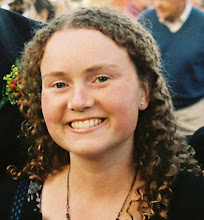I don't think that I am alone in this. I think all of us, in some ways, have learned to hide our true selves to keep ourselves safe.
To a certain extent, this is an important defense mechanism. We should not bare our souls to just anyone; we must learn whom we can trust.
I believe, though, that in many cases this self-protection has gone too far. Too often, we hide who we are because we are afraid of what others will think-- because we are afraid of letting others know the truth. In my case, this usually takes the form of me acting as if I am some kind of superhuman who isn't affected by my circumstances. I act as if I'm not hurt when I am, I pretend I don't care when I do, I claim I don't need help when I really wish someone would lend me a hand.
I don't think that this dishonesty is always-- or even often-- intentional. I think that too often we are dishonest about who we are because we don't know who we truly are. Re-reading Psalm 139 recently, I was blown away by the verse, "I praise you because I am fearfully and wonderfully made." This may have been the first time that I realized that that verse applies to me-- I should praise God because I am fearfully and wonderfully made. Ephesians 2:10 tells us, "We are his workmanship"; I once saw the word "workmanship" here translated as "masterpiece." If we really believe these words, it will make a radical difference in the way we view ourselves and in our ability to open our lives up to other people.
In Much Madness is Divinest Sense, Kathleen Greider writes of "the cost to our souls of social emphases on competitiveness, extroversion, and intelligence, as compared to Christianity's gospel of grace, which asserts that our worth is a gift to us from our beginning." We have immeasurable value, no matter whether we fit into the mold we and society have set for ourselves. Hiding our true selves is a denial of this value.
This doesn't mean that I think we should ignore all of the negative things about ourselves. On the contrary, I think that is part of the problem. As James Bryan Smith says, "As long as we continue to try to think well of ourselves we will have to distort reality.... We will have to create a facade, participate in a charade, and avoid looking closely at our true selves." Part of our misrepresentation of ourselves is due to our unwillingness to look at our selves as we really are-- sinners, yet God's masterpieces, nevertheless. If we cannot admit our fallenness, we cannot accept the grace God gives.
I think that in order to be honest with each other, we must begin by being honest with God and with ourselves. Julian of Norwich wrote, "it is very greatly pleasing to him that a simple soul should come naked, openly and familiarly"; we must come to God as we are, not pretending to be someone else. One of my favorite written prayers is by Brennan Manning; he writes,
I pray as I write these words for the grace to be truly poor before you, to recognize and accept my weakness and humanness, to forgo the indecent luxury of self-hatred...to cling to my humanity, to accept the limitations and full responsibility of being a human being--really human and really poor in Christ our Lord.It is only once we have done this--accepted our weakness and humanity and admitted it to God and ourselves--that we can begin to be honest with anyone else.

Good luck staying away from the banana trees... :-)
ReplyDelete